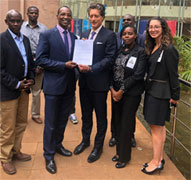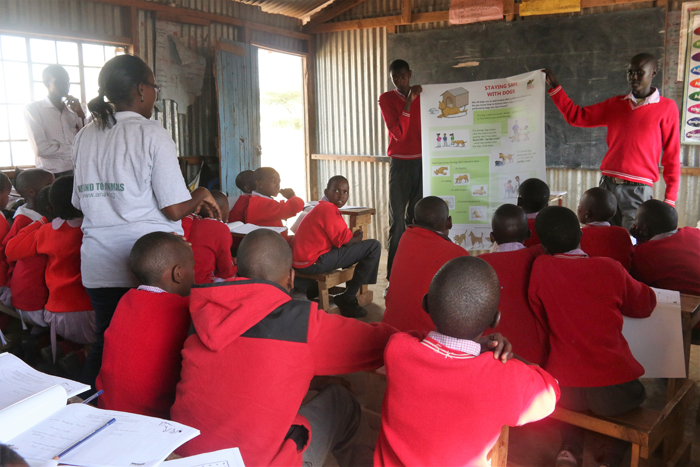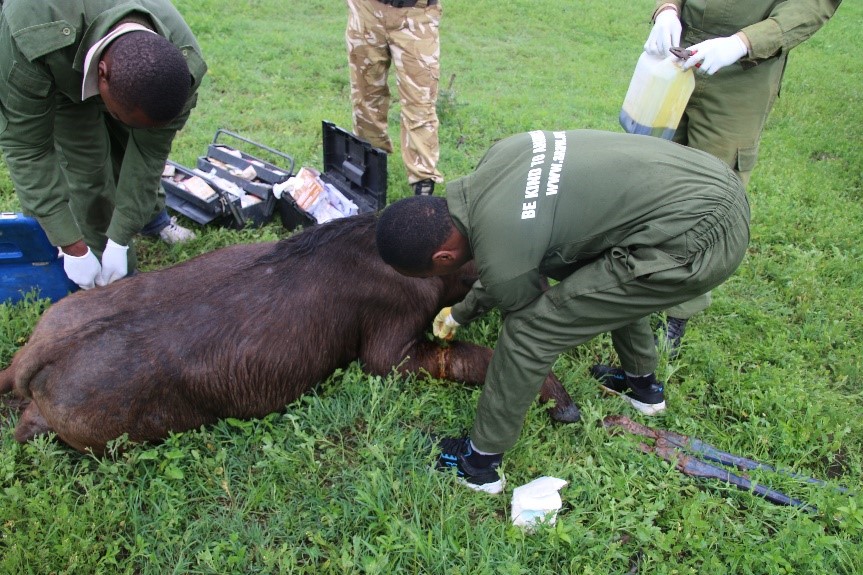Proceedings at the 9th National Judicial Dialogue (8-12 December 2019) convened by the Judiciary Training Institute in collaboration with Africa Network for Animal Welfare (ANAW) for 16 law enforcement agencies in Kenya addressing Wildlife and Environmental crimes.
The Lead agencies include; the Judiciary, Office of the Director of Public Prosecution, Kenya Wildlife Service, Kenya Forest Service and the Office of the Attorney General.
In attendance are Judicial Representatives from Namibia and Mozambique. ANAW is partnering with Wildlife Direct, UNODC and TRAFFIC.
The greatest impact in this program (among others) is that Wildlife and Environmental Crimes have been elevated to economic crimes and the conviction rate of culprits involved has risen from 4% in 2013 to 90.5% in 2019 and amendment of the 2013 Wildlife Conservation and Management Act to strengthen it.
ANAW joined the world in marking the World Animal Day on 4th October, 2019. Hundreds took to the streets of Nairobi to mark the day through the procession that started at Nyayo National Stadium to the Kenya National Theatre where the main event was held
Addressing the participants during the event, Josphat Ngonyo, Africa Network for Animal Welfare’s Executive Director, thanked the participants for turning up in huge numbers to mark this important day. He reminded the attendees that animals are sentient beings and we should always remember that. The guest of honor, Dr. Peter Mbatha, Director for Veterinary Services in Kenya stated that the Animal Welfare Education to be inculcated in schools and colleges because it is an important aspect of our every day life.
During the walk, members of the public were educated through posters and banner messages as well as direct interaction through the public address system
Canisius college students held a successful bake sale event to raise funds in support of Africa Network for Animal Welfare. The fundraising event involved students from The Animal Behavior, Ecology, and Conservation Program who visited Kenya in July 2019. The funds raised will support the education outreach and training program.
 ANAW is glad to announce that its collaboration with the United Nations Environment has been extended for another three years. This cooperation which has mutually served both entities positively will continue to allow both organizations contribute to improved coordination and enhance collaboration with regard to conservation, support of nature and natural resources, addressing climate change, combating pollution among other issues.
ANAW is glad to announce that its collaboration with the United Nations Environment has been extended for another three years. This cooperation which has mutually served both entities positively will continue to allow both organizations contribute to improved coordination and enhance collaboration with regard to conservation, support of nature and natural resources, addressing climate change, combating pollution among other issues.
ANAW and UN Environment have been co- hosting The Africa Animal Welfare Conference since 2017. The conference targets professionals and practitioners, coming together to discuss issues that cut across animal welfare, wildlife and environmental conservation.
The month of August saw ANAW’s de-snaring team continue with routine patrol of Kenya’s wildlife habitation in our project areas, with our partners; Projects Abroad, Serena Lodge, Soysambu Conservancy and Kenya Wildlife Service (KWS). A three-day de-snaring expedition (August 28-30, 2019) in Soysambu Conservancy covering 14 areas in the Conservancy was conducted. The aim of the patrol was to remove snares, rescue trapped animals, report injured animals to KWS as well as identify any illegal activities within the conservancy. The teams collected and recorded field data accordingly.
The foot patrol teams realized the lifting of 16 snares; seven live and nine dead snares. Two zebras were rescued during the activity. ANAW has noted a general decline of snaring activities in the conservancy due to the consisted and concerted efforts with partners..
ANAW’s de-snaring project seeks to safeguard animals’ welfare through removal of snares, rescue, rehabilitation and to ignite interest in conservation and animal welfare within communities through education, awareness and involvement.
One of the crucial steps in curbing the rabies pandemic, is mass dog vaccination. Africa Network for Animal Welfare (ANAW) has been carrying out regular anti rabies vaccination in Machakos and Taita Taveta Counties.
From August 2 – 9, 2019, ANAW hosted a team of 14 members in the second edition of Africa Animal Welfare Adventure Trip consisting of veterinary doctors, and veterinary technicians from the United States of America, who came to support ANAW’s anti-rabies initiative in the aforesaid two counties. Led by Dr. Julie Kelly, the team’s aim of the trip was to address rabies menace through free mass anti-rabies vaccination, outreach and responsible pet ownership among the two counties’ residents. They also conducted additional wound care, clinical assessment, pet grooming and treatment of different ailments. During the clinics the team worked together with local government veterinarians and veterinary technician, as well as ANAW’s staff.
Locals and pet owners were educated on how to reduce dog bite incidents and also how to prevent mass exposure to rabies
A total of 9,347 animals were vaccinated against rabies during the entire campaign. We wish to convey our sincere gratitude to all our partners, friends and supporters, who worked tirelessly with us to accomplish this noble initiative.
 To work towards humane treatment of all animals in communities, attitude change is deemed as a critical pillar for the success of ANAW’s mission. Supported by findings from research information collected over time, ANAW has endeavored to promote a value based education program that inculcates young minds into compassionate individuals on the welfare of animals. This approach led to the establishment of the program called ‘Promoting Animal Welfare in Schools-PAWS’ run through the Animal Welfare Clubs in Kenya.
To work towards humane treatment of all animals in communities, attitude change is deemed as a critical pillar for the success of ANAW’s mission. Supported by findings from research information collected over time, ANAW has endeavored to promote a value based education program that inculcates young minds into compassionate individuals on the welfare of animals. This approach led to the establishment of the program called ‘Promoting Animal Welfare in Schools-PAWS’ run through the Animal Welfare Clubs in Kenya.
The animal welfare clubs were introduced in Kenya in 2013 through a partnership between the Society for the Protection of Animals Abroad (SPANA) - UK and Africa Network for Animal Welfare (ANAW). The program has since expanded to 42 schools spanning over 5 counties i.e. Machakos, Makueni, Kajiado, Nairobi and Kiambu Counties. So far a total of 5850 children have been impacted with knowledge on animals and animal welfare. This is expected to translate to attitude change in approximately 5850 households within the different counties, ultimately resulting to humane treatment of animals in these communities.
The program entails recruiting primary schools into the animal welfare clubs targeting 50 children from Grades 4-7 (mostly children aged between ages 7-13). In these clubs, basic principles on animal welfare are taught to the pupils for a one-year period. It employs an informal teaching methodology through such activities as discussions, games and puzzles which encourage critical thinking, close observation, problem solving and empathy development. Such children are then able to make decisions on their own regarding negative perceptions and myths about animals from an informed perspective.
PAWS is backed by the fundamentals of humane education. Animal welfare is one of the components of Humane Education. Humane Education is a form of education that encourages the understanding for the need of empathy, compassion and respect towards people, animals and the environment and understanding the interrelationship among the three. It is impossible to separate the three hence the need for harmony.
Unintentional cruelty is often passed from one generation to another and this makes humane education vital in our society. A child growing up in a home where animals are ill-treated will likely treat animals ill in future because he or she does not know otherwise. Teaching animal welfare education in schools is one of the best interventions we can offer.
The one-year curriculum used in Animal Welfare Clubs intends to equip children with basic knowledge in animal welfare such as the five welfare needs commonly known as the Five Animal Freedoms.
 It is the purpose of ANAW to demonstrate a hands-on approach to upholding World Organization for Animal Health (OIE) standards on animal welfare. These are internationally accepted practices agreed upon by all member states to be the bare minimum for animal welfare in each country.
It is the purpose of ANAW to demonstrate a hands-on approach to upholding World Organization for Animal Health (OIE) standards on animal welfare. These are internationally accepted practices agreed upon by all member states to be the bare minimum for animal welfare in each country.
As such ANAW works with various governments, communities and stake holders to support the enforcement of these regulations and observation of these standards in our program areas. The animal welfare needs within Kenya are enormous. However, ANAW- in full recognition of the situation and its limitations thereof- supports this course by focusing largely on companion animals, working animals and production animals.
Notably, ANAW’s work is anchored on the appreciation that animals have intrinsic value and are sentient beings able to respond to physiological changes in the environment.
Currently, specific projects being ran to achieve better care for animals include Animal Welfare Clinics and Anti-Bushmeat operations and Campaigns. As a hands-on organization, ANAW addresses the humane treatment of all animals by conducting animal health clinics such as the rabies vaccination clinics and spay/neuter clinics.
This humane treatment initiative dates back to 2006 where ANAW has since been working with both local and international partners to promote better care of pets. Pets in low income communities have been neglected and harshly treated as a result of fear due to the sporadic dog bites and suspected rabies cases reported. ANAW has endeavoured to address this by conducting anti-rabies and spay/neuter clinics in these communities.
ANAW continues to innovate its strategy on a day-to-day basis based on the unfolding of the actual experiences on the ground. These learnings are expected to translate into recommendations that will further define future interventions into offering better care of all animals while continuing to incorporate research into its endeavors.